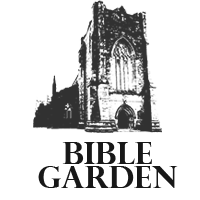Willow (Salix alba)
Map Position: 5There are about 400 different species of willow.
Extracts of its leaves and bark have been used as a remedy for aches and fever; they contain salicylic acid, the active ingredient of Aspirin.
For thousands of years, willow has been used to produce fishing nets, baskets, fences, boats (e.g. Welch coracle), cricket bats, music instruments, brooms, paper, rope and many more.
The two main species of willow in the Holy Land are Salix alba, a tree that also thrives in cooler climate: this is our willow. The other species that is frequently found in the Holy Land is Salix acmophyla which to our knowledge is not found in the UK. There are some mature willow trees at the back of the car park, in front of the Vincent-Farrell-Centre, but they are probably salix caprea (goats willow).

Biblical
As willow trees, their branches and leaves are so versatile it is not surprising that they are mentioned in the Bible on many occasions. Christians in the north-west Europe used willow branches instead of palm branches on Palm Sunday as they do not have any palms. Willow and poplar are often named together and often confused because they grow in the same habitat, near rivers.
In Leviticus, Jews are told how to celebrate Thanksgiving: “And you shall take on the first day the fruit of splendid trees, branches of palm trees, and boughs of leafy trees, and willows of the brook, and you shall rejoice before the Lord your God for seven days” (Leviticus 23.40).
When Job argues with God about his fate, God reminds him that He is almighty and even stronger than the giant monster Behemoth, which is believed to be a hippopotamus, and of which is said: “For his shade the lotus trees cover him; the willows of the brook surround him” (Job 40.22).
In exile in Babylon the Jews lamented: “By the rivers of Babylon – there we sat down and wept, when we remembered Zion. On the willows there we hung up our lyres” (Psalm 137.2).
Isaiah describes a sombre fate for the Moabites after their castles are captured and forced to flee, carrying with them their belongings: “Therefore the abundance they have gained and what they have laid up they carry away over the Brook of the Willows.” (Isaiah 15.7).
God promises Jacob that He will bestow Israel with a blessed and fruitful land: “For I will pour water on the thirsty land and streams on the dry ground […] they shall spring up among the grass, like willows by flowing streams” (Isaiah 44; 3 & 4).
Ezekiel prophesies the future of the house of Israel by telling a parable that demonstrates the power of God: “Then he took from the seed of the land, and planted it in fertile soil. He placed it beside abundant waters. He set it like a willow twig, and it sprouted and became a low spreading vine” (Ezekiel 17.5 and 6).
